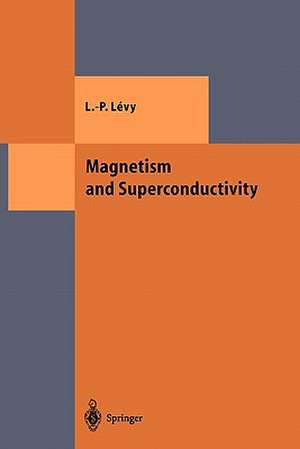Magnetism and Superconductivity: Theoretical and Mathematical Physics
Autor Laurent-Patrick Levy Traducere de S. Lyleen Limba Engleză Paperback – 30 noi 2010
Din seria Theoretical and Mathematical Physics
- 20%
 Preț: 697.22 lei
Preț: 697.22 lei - 18%
 Preț: 744.84 lei
Preț: 744.84 lei - 20%
 Preț: 699.49 lei
Preț: 699.49 lei -
 Preț: 396.81 lei
Preț: 396.81 lei - 15%
 Preț: 721.06 lei
Preț: 721.06 lei - 18%
 Preț: 1120.68 lei
Preț: 1120.68 lei -
 Preț: 398.35 lei
Preț: 398.35 lei - 15%
 Preț: 643.65 lei
Preț: 643.65 lei - 15%
 Preț: 508.60 lei
Preț: 508.60 lei - 20%
 Preț: 652.54 lei
Preț: 652.54 lei - 15%
 Preț: 646.75 lei
Preț: 646.75 lei - 15%
 Preț: 654.12 lei
Preț: 654.12 lei - 15%
 Preț: 649.87 lei
Preț: 649.87 lei -
 Preț: 396.24 lei
Preț: 396.24 lei - 15%
 Preț: 653.14 lei
Preț: 653.14 lei - 18%
 Preț: 960.78 lei
Preț: 960.78 lei - 15%
 Preț: 529.92 lei
Preț: 529.92 lei - 18%
 Preț: 1127.78 lei
Preț: 1127.78 lei - 18%
 Preț: 1548.71 lei
Preț: 1548.71 lei - 15%
 Preț: 551.53 lei
Preț: 551.53 lei - 18%
 Preț: 1002.75 lei
Preț: 1002.75 lei -
 Preț: 396.02 lei
Preț: 396.02 lei - 15%
 Preț: 648.89 lei
Preț: 648.89 lei - 18%
 Preț: 783.35 lei
Preț: 783.35 lei - 18%
 Preț: 973.38 lei
Preț: 973.38 lei - 18%
 Preț: 907.90 lei
Preț: 907.90 lei - 15%
 Preț: 655.78 lei
Preț: 655.78 lei - 18%
 Preț: 1118.93 lei
Preț: 1118.93 lei -
 Preț: 390.25 lei
Preț: 390.25 lei - 15%
 Preț: 663.79 lei
Preț: 663.79 lei - 15%
 Preț: 653.79 lei
Preț: 653.79 lei - 15%
 Preț: 645.28 lei
Preț: 645.28 lei - 15%
 Preț: 604.23 lei
Preț: 604.23 lei - 15%
 Preț: 639.25 lei
Preț: 639.25 lei - 15%
 Preț: 590.81 lei
Preț: 590.81 lei -
 Preț: 395.25 lei
Preț: 395.25 lei - 15%
 Preț: 589.33 lei
Preț: 589.33 lei - 15%
 Preț: 594.24 lei
Preț: 594.24 lei - 18%
 Preț: 911.17 lei
Preț: 911.17 lei - 18%
 Preț: 957.75 lei
Preț: 957.75 lei -
 Preț: 409.13 lei
Preț: 409.13 lei - 15%
 Preț: 532.23 lei
Preț: 532.23 lei
Preț: 543.18 lei
Preț vechi: 670.59 lei
-19% Nou
Puncte Express: 815
Preț estimativ în valută:
103.93€ • 108.81$ • 86.00£
103.93€ • 108.81$ • 86.00£
Carte tipărită la comandă
Livrare economică 04-10 aprilie
Preluare comenzi: 021 569.72.76
Specificații
ISBN-13: 9783642085956
ISBN-10: 3642085954
Pagini: 484
Dimensiuni: 155 x 235 x 25 mm
Greutate: 0.67 kg
Ediția:Softcover reprint of the original 1st ed. 2000
Editura: Springer Berlin, Heidelberg
Colecția Springer
Seria Theoretical and Mathematical Physics
Locul publicării:Berlin, Heidelberg, Germany
ISBN-10: 3642085954
Pagini: 484
Dimensiuni: 155 x 235 x 25 mm
Greutate: 0.67 kg
Ediția:Softcover reprint of the original 1st ed. 2000
Editura: Springer Berlin, Heidelberg
Colecția Springer
Seria Theoretical and Mathematical Physics
Locul publicării:Berlin, Heidelberg, Germany
Public țintă
GraduateDescriere
This
book
was
written
from
lectures
given
to
MSc
students
following
the
'Matter
and
Radiation'
course
at
the
University
of
Grenoble
I.
Although
magnetism
and
superconductivity
cover
a
wide
area
of
physics,
the
course
was
motivated
by
a
common
factor:
these
phenomena
are
realisa
tions
of
thermodynamic
states
which
break
certain
continuous
symmetries.
In
the
case
of
magnetism,
they
break
rotational
invariance.
In
the
case
of
superconductivity,
they
break
gauge
invariance.
The
aim
of
the
course
was
to
bring
out
the
importance
of
broken
symmetries
in
condensed
matter
physics.
The
book
can
be
understood
with
minimal
prerequisites
and
the
math
ematical
techniques
used
are
fairly
elementary.
However,
a
basic
knowledge
of
spin
and
angular
momentum
is
essential,
since
quantum
mechanics
lies
at
the
heart
of
both
magnetism
and
superconductivity.
Chapter
2
reviews
the
main
points.
The
first
chapter
explains
how
thermodynamic
functions
are
constructed
in
the
presence
of
a
magnetic
field.
As
the
book
has
two
parts,
Magnetism
(I)
and
Superconductivity
(II),
these
will
be
specified
between
brackets
in
cross-references
to
sections
and
chapters.
I
have
made
a
particular
effort
to
present
phenomena
in
magnetism
and
superconductivity
by
starting
with
concrete
examples.
Some
technological
applications
of
superconductivity
have
also
been
described.
Cuprins
I.
Magnetism.-
1.
Magnetic
Field
and
Induction.
Thermodynamics.-
2.
Orbital
and
Spin
Magnetism
Without
Interactions.-
3.
Exchange
Interactions.-
4.
Phase
Transitions.-
5.
Mean
Field.-
6.
The
Ising
Model.-
7.
The
XY
Model.-
8.
Linear
Response.-
9.
Spin
Waves.-
10.
Quantum
Spin
Chains.-
11.
Itinerant
Magnetism.-
II.
Superconductivity.-
12.
Macroscopic
Aspects
of
Superconductivity.-
13.
Ginzburg-Landau
Theory.-
14.
The
BCS
Theory
of
Superconductivity.-
15.
Vortices
in
Type
II
Superconductors.-
16.
The
Josephson
Effect
and
Quantum
Interferometers.-
17.
Inhomogeneous
Superconductivity.-
A.
Representations
of
Continuous
and
Point
Groups.-
B.
Second
Quantisation.-
C.
Exercises.
Textul de pe ultima copertă
This
work
presents
a
modern
vision
of
magnetism
and
superconductivity
which
covers
both
microscopic
and
phenomenological
aspects.
The
basic
information
is
illustrated
with
the
help
of
current
research
topics
such
as
the
quantum
Hall
effect
or
mesoscopic
aspects
of
superconductivity.
The
author
systematically
uses
very
intuitive
examples
and
arguments
in
order
to
familiarize
the
reader
with
the
underlying
formalism.
The
present
textbook
addresses
primarily
graduate
students
but
is
also
of
interest
to
scientists
working
in
this
field.
Caracteristici
An
excellent
textbook,
modern
and
up-to-date
